Leadership Interview Guide: Expert Strategies for 2025
Leadership interview expectations are rapidly evolving as organizations face new challenges in 2025. Today’s leaders must navigate hybrid teams, digital transformation, and rising demands for emotional intelligence.
This guide is designed to give you a competitive edge with expert strategies tailored for the modern leadership interview. Whether you’re preparing for a panel, a virtual case study, or an assessment center, you’ll find actionable steps to help you stand out.
Inside, you’ll discover how to prepare for leadership interviews, what organizations seek in top candidates, essential questions, and proven techniques for behavioral and situational responses. We’ll also cover assessments, coaching resources, and post-interview strategies to help you succeed at every stage.
Understanding the 2025 Leadership Interview Landscape
Navigating a leadership interview in 2025 means stepping into a rapidly shifting landscape. Interview formats, expectations, and evaluation methods are evolving fast. Today's candidates must prepare for a process that is as much about adaptability and values as it is about expertise.
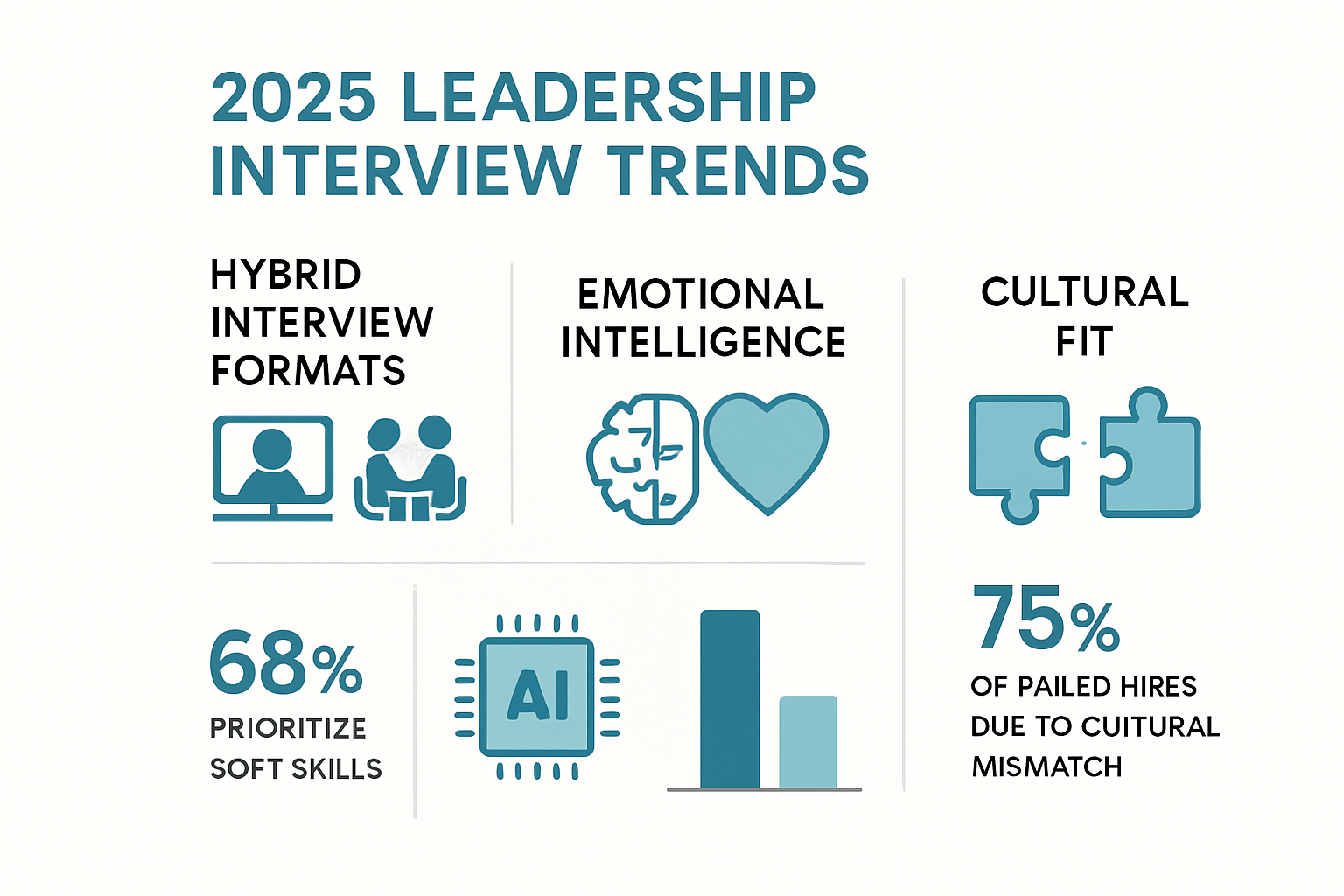
Key Trends Shaping Leadership Interviews
The leadership interview process is being reshaped by several major trends. Remote and hybrid work have made virtual interviews the norm, requiring leaders to demonstrate presence on camera and digital collaboration skills. Organizations now place greater weight on emotional intelligence and adaptive leadership, with 68% prioritizing soft skills over technical expertise (LinkedIn, 2024). AI-driven assessments are also gaining traction, automating initial screening and offering deeper insights into candidate fit. Many Fortune 500 firms now use scenario-based video interviews to evaluate candidates' real-time problem-solving. For a deeper dive into these trends, see Leadership Trends for 2025.
What Organizations Seek in Modern Leaders
When facing a leadership interview, expect organizations to focus on a specific set of qualities. Strategic vision and the ability to make decisions under uncertainty are essential. A proven track record in change management is highly valued, as is a demonstrated commitment to diversity, equity, and inclusion (DEI). Digital literacy and tech-savviness are now baseline expectations. For example, a leading tech company might prioritize candidates who have successfully led digital transformation initiatives.
| Desired Quality | Why It Matters | Example |
|---|---|---|
| Strategic Vision | Navigating uncertainty | Pandemic response plans |
| Change Management | Leading transformation | M&A integration |
| DEI Commitment | Building inclusive teams | Launching ERGs |
| Digital Literacy | Driving tech adoption | Implementing new software |
Common Interview Formats and What to Expect
Leadership interview formats in 2025 are more diverse than ever. Candidates might encounter panel interviews, case study presentations, and assessment centers, each testing different leadership competencies. The rise in virtual interviews introduces new dynamics, such as managing engagement and clarity through a screen. Real-time problem-solving tasks are common, with some organizations using live leadership simulation exercises to observe candidates' responses under pressure. Being prepared for these formats is key to standing out.
The Importance of Cultural Fit and Values Alignment
Cultural fit is a critical focus in every leadership interview. Employers look for alignment with their mission, values, and ethical standards. There's a growing emphasis on ethical leadership and compliance, especially as organizations face increasing scrutiny. Notably, 75% of failed leadership hires are attributed to cultural mismatch. For example, nonprofit organizations often prioritize mission-driven leadership, seeking candidates whose values resonate with their cause. Candidates who can demonstrate this alignment are far more likely to succeed.
Step-by-Step Preparation for Leadership Interviews
Preparing for a leadership interview in 2025 means more than just reviewing your resume. Today’s process is rigorous, data-driven, and designed to assess your readiness for complex leadership challenges. Let’s break down the steps you need to master, so you walk into your next leadership interview with confidence and clarity.
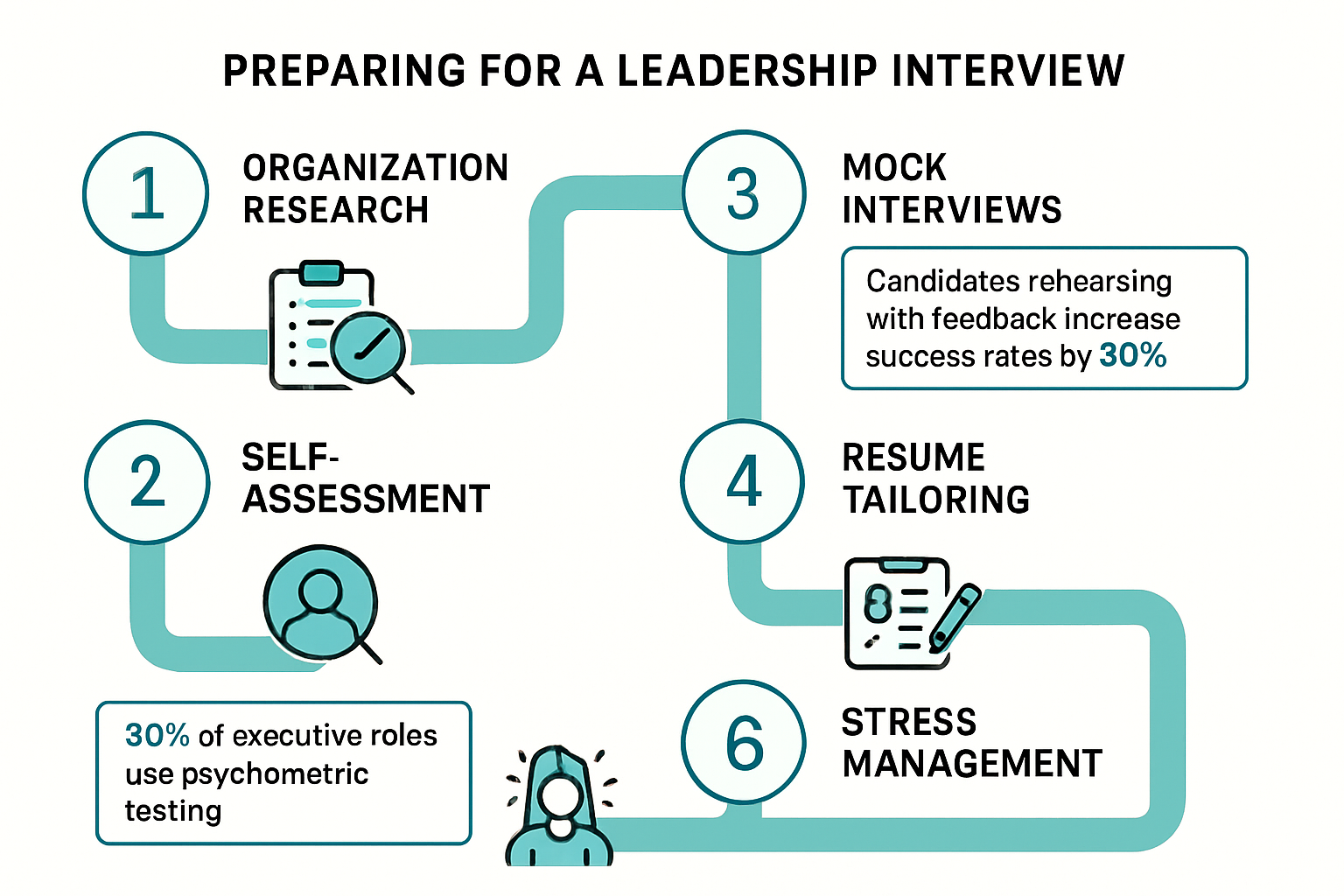
Researching the Organization and Role
Start your leadership interview preparation with a strategic deep dive into your target organization. Explore their mission, values, recent news, and leadership bios. Analyze annual reports and strategic objectives. This helps you map your experience directly to their needs. For example, if you’re interviewing for a sustainability-focused leadership role, study the company’s environmental initiatives and key projects.
In today’s landscape, remote and hybrid work models are common. Understanding these dynamics is crucial. Resources like Remote and Hybrid Leadership Mastery provide valuable insights into how top leaders adapt in modern environments—knowledge that sets you apart in a leadership interview.
Self-Assessment and Personal Branding
Before any leadership interview, reflect on your unique strengths and leadership philosophy. Conduct a 360-degree feedback review to gather insights from peers, reports, and supervisors. This honest self-assessment uncovers areas for growth and highlights your core competencies.
Craft a compelling leadership narrative. Use the STAR (Situation, Task, Action, Result) method to structure stories that showcase your impact. For instance, describe how you led a team through a complex change, emphasizing results and lessons learned. This narrative becomes the backbone of your personal brand throughout every leadership interview.
Practicing with Mock Interviews and Feedback
Rehearsal is a critical part of leadership interview success. Engage in mock interviews with peers, mentors, or professional coaches. Record your answers and review them to spot areas for improvement. Focus on clarity, executive presence, and concise storytelling.
Candidates who practice with targeted feedback increase their leadership interview success rates by 30%. Consider using AI-powered platforms for simulated interviews, especially those designed for remote or hybrid scenarios. This approach helps you adapt to the evolving formats and expectations of modern leadership interviews.
Tailoring Your Resume and Portfolio
Your resume and leadership portfolio should be tailored for each leadership interview. Highlight quantifiable achievements, such as revenue growth, team size, or transformation outcomes. Use metrics to illustrate your impact. For example, “Led a team of 40 through a digital transformation, resulting in a 25% increase in operational efficiency.”
Include a portfolio section with case studies. Summarize how your leadership drove organizational change or innovation. Here’s a quick comparison table to help you focus your updates:
| Preparation Step | Impact on Interview |
|---|---|
| Quantifiable Achievements | Proves results |
| Tailored Role Examples | Shows relevance |
| Portfolio Case Studies | Demonstrates depth |
These elements make your leadership interview responses more credible and compelling.
Preparing for Assessment Tools and Psychometric Tests
Leadership interview processes increasingly involve assessment tools and psychometric tests. Familiarize yourself with common instruments like Hogan, MBTI, or cognitive ability tests. Practice with sample questions to understand what’s measured: cognitive skills, behavioral tendencies, and emotional intelligence.
Did you know 80% of executive roles now use psychometric testing? Approach these assessments as opportunities to showcase your leadership potential. Use your results to identify strengths and growth areas, and be ready to discuss them during your leadership interview.
Managing Stress and Building Interview Confidence
Even seasoned leaders can feel pressure before a leadership interview. Techniques like mindfulness, visualization, and power posing help you stay calm and focused. These strategies build resilience, enabling you to handle high-stakes questions with poise.
Consider executive coaching to further hone your interview performance. Coaches can guide you through stress management techniques and help you practice authentic, confident delivery. Arriving prepared and composed ensures you make a lasting impression during your leadership interview.
Essential Leadership Interview Questions and How to Answer Them
Nailing your leadership interview means more than just answering questions—it’s about demonstrating vision, adaptability, and genuine impact. Interviewers now expect you to showcase not only your experience but also your readiness for the complexities of modern leadership. Below are the essential questions you’ll face and proven strategies to help you stand out.
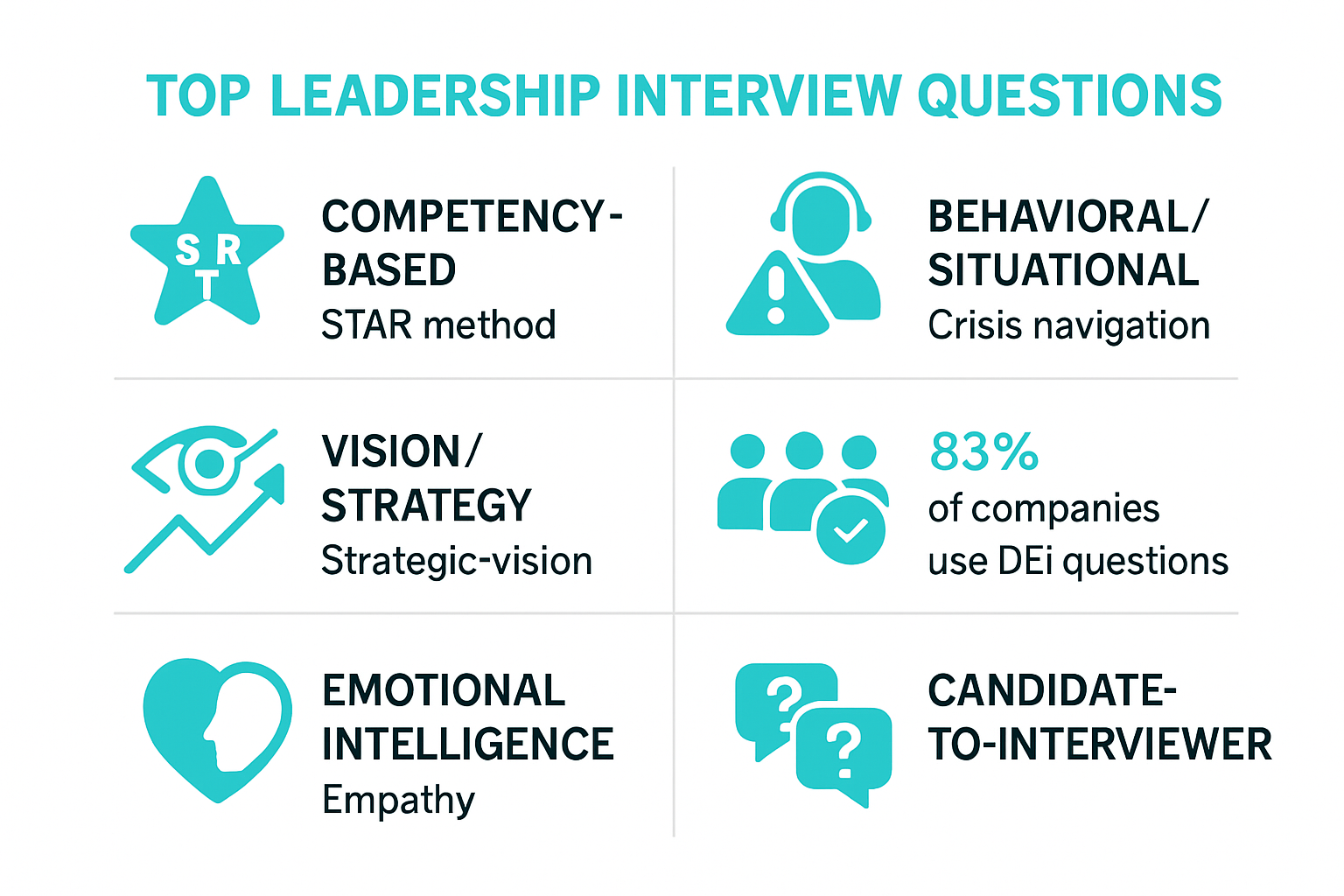
Top Competency-Based Questions
Competency-based questions are at the heart of every leadership interview. Expect to be asked, “Describe a time you led a team through change” or “How do you handle conflict within your team?” The STAR method (Situation, Task, Action, Result) is your best friend here. Structure your answers to highlight the context, your decision-making process, actions taken, and the final outcome.
For example, share a real-world turnaround story where you guided a struggling team to success. Keep your answer focused and quantifiable—mentioning improvements in morale, productivity, or business results. This approach makes your leadership interview responses memorable and impactful.
Behavioral and Situational Questions
Behavioral and situational questions test your adaptability and resilience. You might hear, “Tell me about a failure and how you responded,” or “How would you handle a sudden market disruption?” Here, interviewers want to see evidence of learning agility and creative problem-solving.
Showcase your growth mindset by detailing how you navigated a crisis with limited resources. For added credibility, reference innovative evaluation methods now common in leadership interview processes, such as Measuring Leadership Skills with AI, which assess real-time responses to complex scenarios. Share what you learned and how you applied those lessons in future challenges.
Questions on Vision, Strategy, and Decision-Making
Vision and strategy are core to any leadership interview. You’ll often be asked, “How do you set and communicate a strategic vision?” or “Describe a difficult decision and your process.” Interviewers want insight into your ability to see the big picture and make data-driven choices.
Use examples like leading digital transformation initiatives. Explain how you analyzed data, consulted stakeholders, and adjusted your approach as needed. Clearly articulate your rationale and how your decisions created positive outcomes, reinforcing your fit for the leadership interview process.
Diversity, Equity, and Inclusion (DEI) Focused Questions
DEI-focused questions are now standard in the leadership interview. Interviewers may ask, “How have you promoted DEI in your teams?” or “Describe a time you resolved a bias-related issue.” With 61% of organizations including DEI in interviews, your experience here matters.
Highlight inclusive hiring practices or times you advocated for underrepresented voices. Use the STAR method to structure your story, emphasizing the impact on team culture and business results. Demonstrate an authentic commitment to DEI, making your leadership interview answers stand out.
Assessing Emotional Intelligence and Self-Awareness
Emotional intelligence is a non-negotiable in any leadership interview. Expect questions like, “How do you handle feedback?” or “Describe a time you managed your own stress.” Interviewers look for empathy, self-regulation, and authenticity.
Share examples of coaching struggling team members or transforming critical feedback into growth opportunities. Discuss mindfulness or resilience strategies you use to manage stress. By weaving these elements into your leadership interview responses, you show you’re equipped to lead with both heart and mind.
Questions You Should Ask Interviewers
A great leadership interview is a two-way street. Prepare thoughtful questions to ask your interviewers, such as, “How does your organization define leadership success?” or “What are the biggest leadership challenges currently faced?”
This approach demonstrates strategic thinking and genuine interest in the organization. You might also inquire about leadership development programs or the company’s vision for the future. By turning the tables, you reinforce your value and ensure the leadership interview is a mutual fit.
Mastering Behavioral Assessments and Leadership Simulations
Navigating the modern leadership interview means facing a suite of behavioral assessments and dynamic simulations. These tools reveal how you think, act, and lead under pressure. To stand out, you need to understand the landscape, prepare strategically, and leverage every insight to your advantage.
Types of Leadership Assessments Used in 2025
The leadership interview process in 2025 often begins with a series of standardized assessments. Psychometric tests, 360-degree feedback, and cognitive evaluations are now commonplace. A staggering 92% of large organizations use at least one such tool to gauge a candidate's fit for a leadership role.
These assessments evaluate everything from strategic thinking to emotional intelligence. Increasingly, companies are integrating AI-driven tools to analyze candidate responses and decision-making patterns. For example, the Hogan Leadership Forecast Series is widely used to predict leadership potential and derailers.
Want to stay ahead? Explore how AI in Leadership Decision-Making is shaping the future of executive selection. Understanding these trends is key to a successful leadership interview.
Common Assessment Types Table:
| Assessment Type | Measures | Example Tool |
|---|---|---|
| Psychometric Tests | Personality, motivations | Hogan, MBTI |
| 360-Degree Feedback | Peer and subordinate input | Custom org platforms |
| Cognitive Assessments | Problem-solving, logic | Watson-Glaser, SHL |
How to Excel in Leadership Simulations
Leadership simulations are now a core part of the leadership interview. These scenarios replicate real-world challenges, such as crisis management or business case studies, and require candidates to demonstrate situational awareness and decision-making under time constraints.
To excel:
- Listen carefully to the scenario details.
- Clarify objectives before acting.
- Communicate your thought process aloud.
- Prioritize ethical and data-driven decisions.
For example, in a simulated crisis, outline your immediate actions, involve stakeholders, and adapt as new information emerges. Practicing these simulations is vital, as they closely mirror the unpredictable nature of modern leadership.
Your ability to perform under pressure in these exercises often determines your success in the leadership interview.
Interpreting and Leveraging Assessment Results
After the leadership interview, you'll often receive feedback or reports from your assessments. These results are goldmines for growth if you know how to use them.
First, review your strengths and development areas. Look for patterns—do multiple assessments highlight similar feedback? Use this insight to craft a personal leadership growth plan.
Steps to leverage your results:
- Reflect on feedback and compare with your self-perception.
- Identify actionable areas for improvement.
- Set measurable goals to address gaps.
- Share your learnings in future interviews to show self-awareness.
Employers value candidates who can interpret and act on feedback—it's a sign of high leadership potential in the leadership interview process.
Common Pitfalls and How to Avoid Them
Many candidates stumble during the leadership interview assessments by over-preparing or misreading the objective. Authenticity is key—interviewers can quickly spot rehearsed answers.
Pitfalls to avoid:
- Focusing only on technical skills, neglecting soft skills.
- Ignoring organizational values in your responses.
- Overlooking the purpose of the assessment.
To avoid these traps:
- Balance preparation with genuine responses.
- Highlight both results and team dynamics.
- Stay aligned with the company’s mission.
Remember, the leadership interview is not just about what you know, but how you lead and adapt.
The Role of Executive Coaching in Assessment Preparation
Executive coaching has become a game-changer for leadership interview readiness. Coaches help you interpret assessment feedback, develop targeted strategies, and build confidence for high-stakes simulations.
Leaders who work with coaches improve their assessment outcomes by 40%. Coaching provides a safe space to practice, receive candid feedback, and refine your approach.
Consider these benefits:
- Personalized preparation for assessment tools
- Honest critique of simulation performance
- Strategies to showcase your authentic leadership style
Investing in coaching before your next leadership interview can set you apart and ensure you bring your best self to every stage of the process.
Leveraging Leadership Coaching and Professional Development Resources
Unlocking your full potential for a leadership interview requires more than just technical know-how. Today’s top candidates invest in coaching and development resources to gain a competitive edge. By tapping into expert guidance and community-driven learning, you’ll not only prepare for the interview but also set the stage for long-term leadership growth.
The Value of Leadership Coaching for Interview Preparation
Professional coaching is a game-changer for anyone facing a leadership interview. Coaches offer tailored feedback to help you refine your executive presence, improve your communication, and address blind spots in your approach.
Key benefits of working with a leadership coach include:
- Personalized strategies for answering high-stakes questions
- Enhanced confidence through real-time practice
- Actionable insights to strengthen your leadership narrative
Research shows that candidates who leverage coaching report higher success rates in leadership interview scenarios. By investing in coaching, you build the resilience and self-awareness needed to stand out.
Noomii Corporate Leadership Program: Precision Coaching for Leadership Success
The Noomii Corporate Leadership Program stands out for its evidence-based approach to leadership interview preparation. Noomii uses advanced diagnostics to identify your strengths and growth areas, then matches you with a coach who fits your needs.
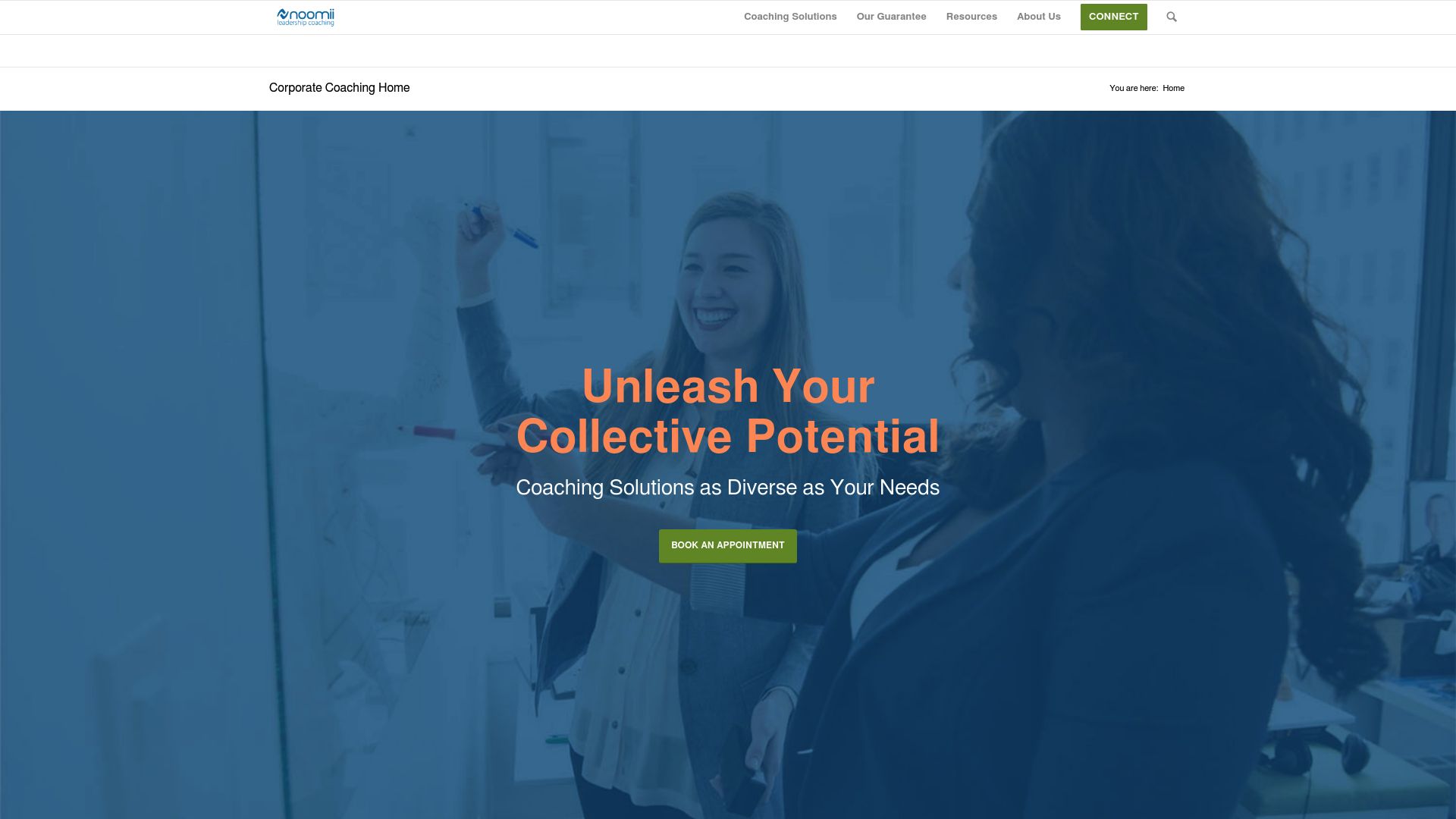
Program highlights:
- Precision coach matching for optimal fit
- Custom intervention plans targeting interview readiness
- Scalable solutions for individuals and organizations
Participants in Noomii’s program report measurable improvements in leadership interview performance and on-the-job results. If you want a proven resource to accelerate your leadership journey, Noomii is a top choice.
Utilizing Online Learning Platforms and Leadership Communities
Supplementing coaching with online learning can further boost your leadership interview readiness. Platforms like LinkedIn Learning and Harvard ManageMentor offer masterclasses, webinars, and peer networks focused on current leadership trends.
Ways to use these resources effectively:
- Take targeted courses on emotional intelligence and strategic leadership
- Join leadership communities to exchange insights and interview tips
- Stay updated on industry best practices and evolving expectations
Engaging with these platforms ensures you remain agile and well-prepared for every leadership interview opportunity.
Building a Long-Term Leadership Development Plan
A successful leadership interview is just the beginning. To sustain your growth, create a development plan that tracks your progress well beyond the interview stage.
Consider this simple roadmap:
| Timeline | Focus Area | Action Steps |
|---|---|---|
| 0–3 months | Interview debrief & gaps | Review feedback, set learning goals |
| 4–8 months | Skill expansion | Attend workshops, seek mentorship |
| 9–12 months | Leadership impact | Lead new projects, measure outcomes |
Regular self-assessment and continuous learning will keep you sharp for every future leadership interview and role.
Post-Interview Strategies for Leadership Candidates
After completing your leadership interview, your next steps are just as important as your performance in the room. Strategic follow-up, thorough evaluation, and proactive planning can set you apart from other candidates. Here’s how to maximize your impact and prepare for success in your new leadership role.
Following Up with Impact
The hours after your leadership interview present a golden opportunity to reinforce your candidacy. Always send a personalized thank-you note within 24 hours. Reference a key discussion point to show you were fully engaged during the leadership interview.
- Express gratitude for their time.
- Highlight one insight you gained.
- Reiterate your fit for the role.
Some candidates go further by sharing a brief summary of their post-interview reflections or tailored ideas for the team. This proactive approach demonstrates your commitment and leaves a lasting impression after the leadership interview.
Evaluating Offers and Organizational Fit
When you receive an offer following your leadership interview, take time to assess how the role aligns with your values and long-term ambitions. Beyond salary, consider the company’s culture, leadership style, and growth opportunities.
| Criteria | Questions to Ask |
|---|---|
| Culture & Values | Do they match my leadership style? |
| Compensation | Is the package competitive? |
| Growth Opportunities | Are there clear paths to advance? |
Data shows that 54% of leaders decline offers due to poor cultural fit. Evaluating these factors ensures your next leadership interview leads to a position where you can truly thrive.
Negotiation Strategies for Leadership Roles
Approaching negotiations after a leadership interview requires preparation and confidence. Research market rates for your role and be ready to discuss salary, bonuses, equity, and non-monetary benefits.
- Prioritize your must-haves.
- Consider asking for professional development support.
- Be transparent about your expectations.
Negotiations are not just about money. Many leaders successfully negotiate for flexible work, mentorship, or additional resources. Remember, the leadership interview is just the beginning of shaping your future with the organization.
Preparing for Onboarding and Early Success
Once you accept an offer from your leadership interview, shift focus to a strong start. Develop a 30-60-90 day plan outlining your priorities and key relationships to build. Early wins can set the tone for your leadership journey.
- Schedule meetings with cross-functional teams.
- Seek feedback from your new manager.
- Align your early goals with organizational strategy.
By planning ahead, you demonstrate the proactive mindset valued in every leadership interview and position yourself for lasting impact from day one.
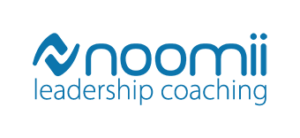
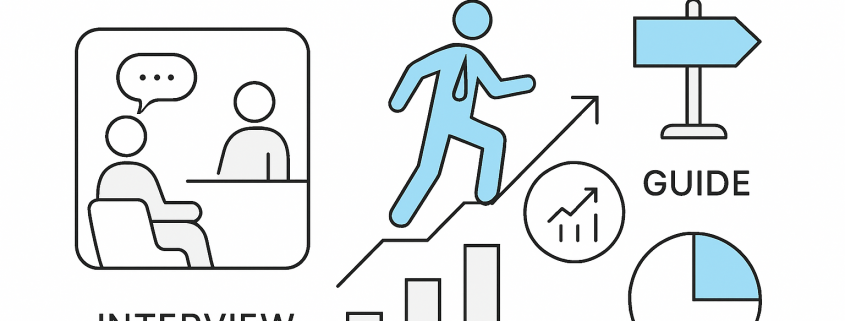


Leave a Reply
Want to join the discussion?Feel free to contribute!